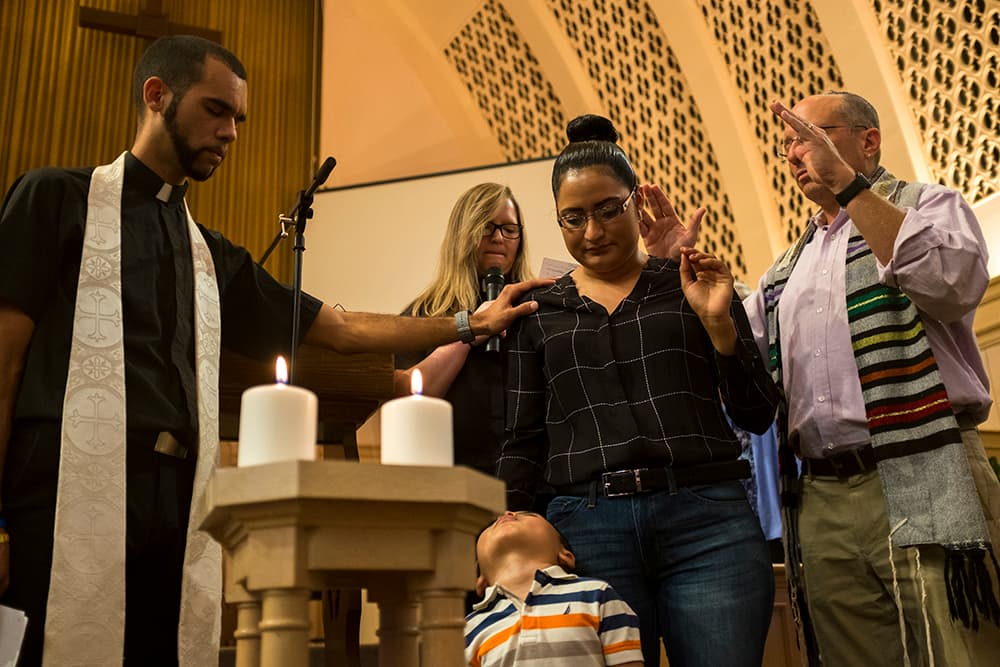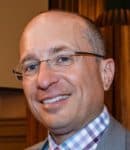
By Rabbi Adam Morris
Araceli Velasquez physically entered into sanctuary in Park Hill United Methodist Church and Temple Micah on Tuesday, August 8, 2017. In my mind and my heart, her spirit first entered into Sanctuary with our communities on Tuesday, November 8, 2016 -- Election Day.
At the time it was not as if my friend and colleague at PHUMC, Pastor Eric Smith, and I had any inkling that we would ask our congregations to become part of the Metro Denver Sanctuary Coalition. My awareness of the nature of U.S. immigration law was peripheral, at best.
What I was certain of in the days following the election (and even more so in the weeks and months that would follow) was that my understanding of my country and my relationship to it faced a dramatic overhaul. Beginning with the election and in countless moments since I have witnessed a sanctioning of belittling, disrespecting and even demonizing the other -- whether otherness is defined by ethnicity, nationality, religion, gender or ideology.
It felt like (and still feels like) a frightening, but very important historical moment. One in which I am compelled to respond to as a father, an American, a Jew, a rabbi and as a human being. I wrote to the Temple Micah community about the process of integrating this shifting reality into my worldview and what it might look like to actively participate in this new reality ...
“I often wonder what it was like to be a rabbi during another tumultuous time in our country’s history, the Civil Rights movement. I wonder if I would have had the clarity of purpose and courage of conviction to act as so many of my ecclesiastical ancestors did at that time. I always assume — since we study in hindsight about what they did — that the ‘what?’ was clear to them at the time. However, as I find myself in this historical moment, I am revisiting that assumption. I wonder if those ecclesiastical ancestors of mine felt the dissonance between the clarity of what was wrong and the ambiguity of what to do about it.”
We choose sanctuary as a response to this historical moment because this movement speaks to the most fundamental values of both of our communities. Pastor Smith (who began this journey with me) and Pastors Nathan Adams and Angela Heesacker (my current colleagues at PHUMC ) share the belief that how we treat the ‘other’ may be the foundational cornerstone of our religious traditions. Our traditions teach us that every human being is created in the divine image (Genesis). Our traditions command us to “Love your neighbor” (Leviticus) and “Love the stranger” (Deuteronomy). The Jewish sage, Hillel, boiled it all down to one idea: “What is hateful to you, do not do to another.” The father of the Christian Church, Paul, put it this way: “When one part suffers, all the parts suffer as well” (First Corinthians).
We choose sanctuary as a response to this historical moment because this social action falls within the spiritual jurisdiction of mature and responsible religious institutions. Practically speaking, it was not only about what we believe, but finding an appropriate, constructive and meaningful way to put these convictions into action. Historically, religious institutions have stood up and out to provide safe places when the established laws and authority became dangerously out of sync with our highest values. Sanctuary not only fits our historical legacy, but enables us to continue to fully participate in this watershed point in the great American experiment.
In March our two communities began to explore this response together. "Together" is an important aspect of our story. Park Hill UMC has served Park Hill and the Denver community for more than a century. In December of 2013 Temple Micah became renters in this space. In truth both institutions wanted more than simply a financially rewarding arrangement around space usage. We believed that we were entering a covenant with one another. We hoped that we would learn and grow from learning more about the other community's ideas, traditions and practices. We, also, humbly hoped that we might model the kind of respect and cooperation we envision for the world. We entered this covenant together with great faith in the unimagined opportunities that might unfold before us.
And so, together, we explored what the path of becoming a sanctuary community would entail. First, we listened, questioned and learned from people of the Metro Denver Sanctuary Coalition who have been organizing and confronting the injustice of U.S. immigration laws. We sat at the feet of people from First Unitarian Society of Denver and the Mountain View Friends Meeting as they shared the process, blessings and challenges of hosting Jeannette Vizguerra, Ingrid Latorre and Arturo Hernandez Garcia in sanctuary in their communities. We asked philosophical questions about the nature of U.S. immigration law and the legality and liability of involving ourselves in this fashion. We asked practical questions about where our potential guests would sleep, eat and bathe and what would have to be done to the facility to create hospitable conditions for all of the above. We asked self-critical questions about whether we were up to this responsibility.
Honestly, once we heard the ‘click’ of the philosophical alignment within and between our two communities -- and we heard it early and quickly -- the communities lined up to respond to the practical, concrete and logistical questions. Upon the formal sanctioning by each community in mid-June, the work and preparation for welcoming unknown guests into our shared sacred space began.
The Metro Denver Sanctuary Coalition works with many individuals who face the possibility of deportation. The coalition provides, legal, emotional and logistical support to these individuals. The choice of entering into sanctuary is not made by an individual until every other option is exhausted. When Araceli reached that point in her process, she met with our two communities. She shared with us the path that lead her to us. We shared with her the path that led us to her. Grounded in the sacred covenant of our two communities, we felt ready to enter into another sacred covenant with Araceli and her family.
We stand with Araceli so that she may fight to stay with her family. We stand with Araceli so that we may fight to ensure that the values of justice and compassion live in our American legal system and in our way of life. We stand with Araceli because it is the right Christian, Jewish, American and human thing to do.

Rabbi Adam Morris, known in the community as Rabbi Mo, landed at Temple Micah in 2003 after a rabbinical quest that took him around the world. A native of Cleveland, he has worked in communities in Nashville, Charlotte, Atlanta and Adelaide, South Australia - serving in congregations large and small as well as in a Jewish day school.










